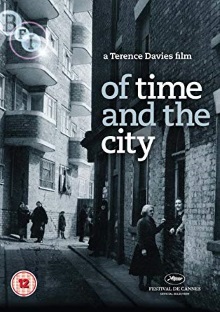
This has been on my to watch list ever since I saw A Quiet Passion which I continue to love. A documentary, essentially a love letter, made up of old newsreel footage about the city of Liverpool where director Terence Davies grew up, sounds very appealing. However documentaries are especially difficult to track down and it took me a long time to find an acceptable copy.
Through images and the narration of his own rich voice, Davies takes us on a journey through his childhood in Liverpool. The black and white footage shows us not only the streets and buildings he knew in the 1950s but also the people who lived there: the children playing by the road, the women cooking in the kitchen, pedestrians and many more. Early on it shows how much Davies loved the cinema as a young boy and then moves on to major events like the Korean War and the marriage and coronation of Queen Elizabeth II. Through liberal use of quotes from poetry, especially from A.E. Housman’s A Shropshire Lad, and use of the appropriate music to mark how the city changes across the years, Davies evokes powerful emotions and no doubt even more powerful memories for those who knew the same Liverpool that he did. As he grows up, it also shows him grappling with his loss of faith in religion and his own homosexuality. The documentary takes on as a darker tone as well as the quaint buildings he knows are torn down to make way for flats but the film makes it clear that all this is part of the natural course of things.
I’d expected this documentary to offer a bit more information on the city of Liverpool and be more factual. Instead, this is an intensely personal and emotional experience, making it one of the best films I’ve ever watched. There is simple joy, an inevitable sense of longing, bitterness and even humor. I was shocked by the venality of Davies’ attitude towards the royals and amused that by the time the Beatles arrived on the scene, his tastes had grown more sophisticated and moved on to classical music. I was a little disappointed that like any other nostalgia suffused work of art, it is always the era of his own childhood that carry the fondest memories while any change to the city is always for the worse. Yet I was heartened later to see that Davis is self-aware enough to understand that this is true of everyone and that even though modern Liverpool is a stranger to him, for the children who are growing up now this is the Liverpool that they know and love.
I do think that Davies could stand to be a little more precise in differentiating when he is quoting from poetry and when he is speaking in his own words. But otherwise this is a near perfect masterpiece. I especially appreciate how the film itself reveals hidden depths about Davies himself. For example, even as he recounts his growing disillusion with Protestantism until he finally declares himself as an atheist, he can’t escape from how his views and values are profoundly rooted in the religion he grew up with. His narration and the poetry he quotes from continue to allude to God and Christianity and the beautiful footage that he captures of the city continues to exalt the symbology and grandeur of the religion. Similarly even as he dismisses Queen Elizabeth II and her consort as Liz and Phil, many of his fondest memories are inextricably tied up with the royals and the aristocracy. For example, where would the Grand National be without the prestige and horses of the nobility? It’s a powerful reminder of the complexity of the elements that make up one’s sense of identity.
Once again this is a brilliant film and easily among the very best of the documentaries I’ve ever watched. With Davies’ love of beautiful prose so clearly on display, it’s no wonder that he did such a great job with A Quiet Passion.
One thought on “Of Time and the City (2008)”